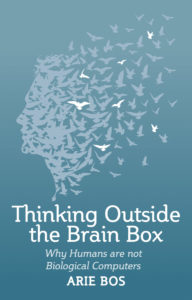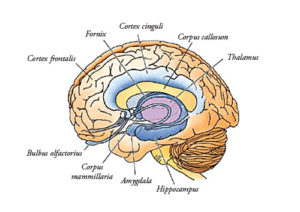Thinking Outside the Brain Box – an alternative neurophilosophy
by Floris Books • 18 August 2017 • Arie Bos, Holistic Health, Non Fiction, Philosophy of Human Life • 0 Comments
A human being works like highly sophisticated computer with a high-powered processor, known as the brain, at its core. Or so the prevailing worldview in neurophilosophy would have you believe.
Arie Bos – a Neurophilosophy expert – seeks to challenge ideas such as these. In this extract from Thinking Outside the Brain Box, Bos explains one fundamental principle at the heart of his study.
‘I find it a very reassuring idea that we are our brain,’ said the lady.
‘How so?’ I asked.
‘Well, I’m really addicted to cigarettes, and now I know that it’s simply something genetic in my brain.’
‘And you find that reassuring?’
‘Yes, my brain simply longs for nicotine; there’s nothing I can do about it.’
‘So your brain is actually very happy to be addicted?’
‘I guess you could say that.’
We drank. An important problem seemed to have been solved.
‘And you? Are you also happy to be addicted?’
‘No, of course not. It’s extremely bad for your health, but what can you do about it?’
That was a snippet of a conversation at a party, a real contemporary conversation, because the brain is a hot topic. The lady was quoting from the title of Dick Swaab’s wildly successful book, We Are Our Brain, but she had ostensibly missed the drift of it. For of course you can’t be your brain and at the same time want something other than the brain wants. And, according to the title of the book, self and brain coincide. Evidently, it is difficult to truly recognise the consequence of that. This not only holds for laymen, but also for some neuroscientists and neurophilosophers who, each in their own way, proclaim that we are our brain.
Actually, the lady at the party precisely evoked the problem: are we capable of separating ourselves from our brain, doing something different from what the brain ‘wants?’ I try to make a credible case that this is indeed the case. Otherwise, what purpose would our self-reflecting consciousness serve? Before making the attempt, however, I first have to make a scientific-philosophical statement: except in mathematics, science does not prove, it makes credible. It shows connections, correlations. What is much more difficult is to demonstrate or prove what is cause and effect in these correlations. Causality is always an interpretation.

Inside the pictures: cat, rat, human. Red: primary visual cortex. Blue: primary auditory cortex. Green: primary motor and sensory cortex.
The Fly
Certainly there are lots of creatures that are their brain – the fly, for instance, that is flying round and round in my room right now, and hits its head against the window all the time. It is doing what flies have done for ten thousand or perhaps a hundred thousand years: nothing but what their tiny little brains tell them to do. And those tiny little brains provide for a behaviour that has allowed them to survive in their eco-system. Only at that time there were no windows, and the little creatures haven’t learned much since then.
But we are born with brains that still have to learn an awful lot of things, and are formed by such learning. We are therefore not our brain, but produce it ourselves, so to speak. From the beginning of evolution, the brain has been principally occupied with the body. This holds not only for flies, but also for us and some forms of bodily behaviour such as eating, coughing, throwing up, relieving ourselves, and so on. But even these are things human beings have to learn to control. Behaviour and the considerations connected with it were the next step in the evolution of the brain, and in human beings this has come to play an incomparably large role. Children are quickly able to do very different things than their parents, while their brains are much the same.
 About the book
About the book
Thinking Outside the Brain Box is a revealing book that challenges the prevailing materialist worldview in neurophilosophy and explores the true nature of the human brain.
Arie Bos practiced medicine as a general physician in Amsterdam for over thirty years. He now teaches in Philosophy of Science and Neurophilosophy at the University of Utrecht.
